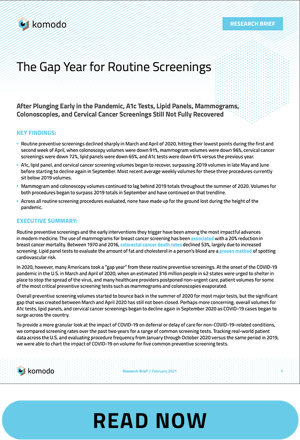The Gap Year for Routine Screenings

 For many of the world’s deadliest diseases – from cancer to cardiovascular disease to diabetes – routine preventive screenings play a critical role in improving outcomes. The use of mammograms for breast cancer screening has been associated with a 20% reduction in breast cancer mortality. Between 1970 and 2016, colorectal cancer death rates declined 53%, largely due to increased screening. Lipid panel tests to evaluate the amount of fat and cholesterol in a person’s blood are a proven method of spotting cardiovascular risk.
For many of the world’s deadliest diseases – from cancer to cardiovascular disease to diabetes – routine preventive screenings play a critical role in improving outcomes. The use of mammograms for breast cancer screening has been associated with a 20% reduction in breast cancer mortality. Between 1970 and 2016, colorectal cancer death rates declined 53%, largely due to increased screening. Lipid panel tests to evaluate the amount of fat and cholesterol in a person’s blood are a proven method of spotting cardiovascular risk.
Even so, encouraging preventative testing continues to prove a major challenge. As recently as 2015, a study in Health Affairs found that only 8 percent of Americans ages thirty-five and older reported having received all of the appropriate, high-priority clinical preventive services recommended for them; nearly 5 percent reported having received none of them.
Mitigating COVID-19 – and Creating a “Gap Year” for Other Conditions
Now, the COVID-19 pandemic has exacerbated these challenges, keeping many Americans home from doctors’ offices and labs and creating new barriers to preventative screening. What happens when the hard work to improve preventative screening is so dramatically disrupted? And what will the longer-term impacts be of the massive gap in preventive testing that is growing out of the COVID-19 pandemic?
According to a new analysis conducted by Komodo Health, routine preventative screenings declined sharply in the spring of 2020 as people across the country were urged to shelter in place and many healthcare providers postponed non-urgent care to mitigate the spread of COVID-19. Some testing types, like A1c tests, lipid panels, and cervical cancer screenings, began to recover in volume before dropping again in the fall; others, like mammograms and colonoscopies, have continued to lag behind 2019 totals throughout the year.
Among the key findings, routine preventive screenings declined sharply in March and April of 2020, hitting their lowest points during the first and second week of April when colonoscopy rates were down 91% and mammogram rates were down 96%, compared to the same time period in 2019. During that same period in April, cervical cancer screenings were down 72%, lipid panels were down 65%, and A1c tests were down 61%.
These trends began to recover in late May and June before starting to decline again in September. Most recent average weekly rates for A1c tests, lipid panels, and cervical cancer screenings remain below the normal volume of procedures that would be expected based on 2019 data. Similarly, mammogram and colonoscopy rates continued to lag behind 2019 totals throughout the summer of 2020. Rates for both procedures began to surpass 2019 rates in September and have continued on that trendline.
Across all routine screening procedures evaluated, none have made up the ground lost during the height of the pandemic.
The winter months have already proven that the pandemic is far from over. The recent surges of COVID-19 are wreaking a deadly force across the U.S., while COVID-19 vaccination efforts have been slow. Until herd immunity is reached, the industry should heed these trends in preventative screenings and ensure patients “catch up” on deferred care.
As healthcare professionals continue, rightfully, to focus on the urgent crisis of COVID-19 itself, Komodo plans to expand its research to further understand the scope of these declines in screenings on chronic disease management and overall healthcare outcomes – and consider the most effective routes for proactively detecting and treating these deadly conditions even as the pandemic surges on.
Download the research brief to learn more.







